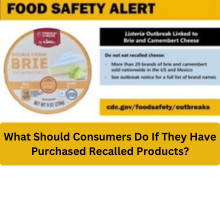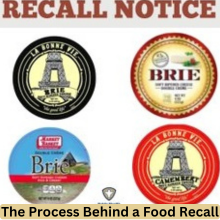
In early November 2024, a voluntary recall was issued for several popular types of Brie cheese sold across 12 states. The recall was prompted by a potential contamination of Listeria monocytogenes, a bacteria that can cause serious health risks, especially to vulnerable populations. The affected cheeses were distributed through major retailers, including popular chains like ALDI and Market Basket. If you’ve recently purchased soft, Brie cheese, it’s important to check your refrigerator for the affected products.
This article provides an in-depth look at the recall, its risks, and what consumers need to do next to ensure their safety.
The Scope of the Recall
The cheese recall has affected numerous states across the U.S. If you live in any of the following states, you should take immediate action to check whether you’ve purchased any of the recalled products:
- California
- Colorado
- Connecticut
- Illinois
- Indiana
- Iowa
- Missouri
- Massachusetts
- New Jersey
- Oregon
- Texas
- Washington
These states have seen a distribution of the affected cheeses, and retailers in these regions are in the process of removing the products from store shelves. Notably, ALDI and Market Basket, which are widely recognized supermarkets, were involved in the recall.
Consumers who purchased these cheeses in any of the affected states should carefully inspect their products and avoid consuming them.
What Are the Affected Cheeses?
The products being recalled include several types of Brie cheese and Camembert cheese from different brands, all of which were sold in stores across the 12 affected states. The specific products are:
- Aldi Emporium Selection Brie (12/8 oz Brie)
- La Bonne Vie Brie (6/8 oz)
- La Bonne Vie Camembert (6/8 oz)
- Industrial Brie (12/8 oz)
- Market Basket Brie (6/8 oz)
- Supreme Oval Brie (7 oz, 6/7 oz)
These cheeses were sold with a “best buy date” of December 24, 2024, and can be identified by the UPC codes printed on their labels.
If you’ve purchased any of these products, it’s crucial to check their labels for these details. The cheeses were distributed to stores that have already begun removing them from their shelves.
What Is Listeria and Why Is It Dangerous?
Listeria monocytogenes is a type of bacteria that causes listeriosis, an infection that can be extremely dangerous, especially for certain at-risk groups. Listeria is most commonly found in contaminated food products, and soft cheeses like Brie are a well-known source of this bacteria.
While Listeria infection is often mild for healthy individuals, it can have severe consequences for vulnerable populations, including the elderly, pregnant women, young children, and individuals with weakened immune systems.
Health Risks of Listeria Contamination
Listeria can cause symptoms ranging from mild to severe. In healthy individuals, the infection may lead to:
- Fever
- Headaches
- Muscle aches
- Nausea
- Diarrhea
However, the risks are far more serious for certain groups:
- Pregnant women may experience miscarriage, stillbirth, or preterm labor.
- Newborns, older adults, and individuals with compromised immune systems are at a higher risk of severe infection, which can include meningitis or sepsis.
In some cases, Listeria can be fatal, especially in individuals with weakened immune systems.
What Should Consumers Do If They Have Purchased Recalled Products?
If you have recently bought any of the affected cheeses, the FDA advises you to take immediate action. Here’s what you should do:
- Do not consume the recalled products: Listeria contamination can lead to serious illness, so it’s essential to avoid eating the affected cheeses.
- Return the product to the place of purchase: For a full refund, return the products to the store where you bought them. Retailers like ALDI and Market Basket are already offering refunds for recalled items.
- Contact the manufacturer: If you have questions about the recall, you can reach out to Savencia Cheese USA, the manufacturer, via their consumer service line at 800-322-2743.
How to Identify Recalled Products
To determine whether you have purchased one of the affected cheeses, look for the UPC codes and best buy dates printed on the packaging. Specifically:
- The affected products are labeled with a best buy date of December 24, 2024.
- The UPC codes vary by product, so it’s important to check the packaging for specific details.
You can find these codes on the product labels, and they will help you identify whether your purchase is affected by the recall.
The Importance of Food Safety and Monitoring Recalls
Food safety is crucial for protecting consumers from potential health risks, and recalls are an essential part of ensuring food safety across the U.S. When contamination is discovered, the FDA takes immediate action to alert consumers and businesses alike to prevent further incidents. This particular recall was initiated by Savencia Cheese USA after processing equipment tested positive for the presence of Listeria.
Recalls help to protect public health by removing dangerous products from the market and reducing the likelihood of an outbreak.
The Process Behind a Food Recall
Recalls typically happen when contamination is detected, either through routine inspections or reports from health authorities. In this case, Savencia Cheese USA identified Listeria contamination at their manufacturing facility and voluntarily issued a recall. The company also worked closely with retailers like ALDI and Market Basket to ensure that the affected products were removed from store shelves promptly.
Once a recall is initiated, the FDA works with public health officials to communicate the situation to consumers and prevent any further health risks.
What Is Being Done to Prevent Further Listeria Outbreaks?
In response to the recall, Savencia Cheese USA is taking additional precautions to prevent further contamination. The company has already stepped up its food safety measures in the processing plant to ensure that such contamination does not occur again.
Food manufacturers must constantly monitor their production processes and adhere to strict safety standards to prevent contamination. Additionally, the FDA conducts regular inspections to ensure facilities comply with food safety regulations.
How Food Manufacturers Ensure Product Safety
Food safety in manufacturing involves a rigorous process of sanitation, monitoring, and testing. Regular testing of raw ingredients, as well as finished products, is essential to identify potential contaminants early on. When contamination is found, manufacturers must quickly issue a recall and investigate the cause of the issue.
Also read: Republicans Kill Social Security Bill: Here’s Why
The Role of Retailers in Handling Recalled Products
Retailers play a critical role in the recall process. Once notified of a potential issue, stores like ALDI and Market Basket must quickly remove the affected products from their shelves to ensure consumer safety. They also provide consumers with information on how to return recalled items for a full refund.
Supermarket Chains Affected by the Recall
The recall affects several grocery store chains, including ALDI and Market Basket, both of which have already removed the affected products from their shelves. If you’ve purchased any of the recalled products from these retailers, return them for a full refund.
A Closer Look at Listeriosis and Its Symptoms
Listeriosis is a serious infection caused by consuming food contaminated with Listeria monocytogenes. The symptoms of listeriosis can vary, depending on which part of the body is affected:
- Infection of the bloodstream or brain can cause fever, stiff neck, and confusion.
- Intestinal illness often causes symptoms like nausea, diarrhea, and abdominal cramps.
If you suspect you’ve been exposed to Listeria, seek medical attention immediately.
When to Seek Medical Help After Listeria Exposure
If you experience symptoms like fever, muscle aches, or gastrointestinal distress, especially if you’re in a vulnerable group (pregnant, elderly, or immunocompromised), it’s essential to consult a healthcare professional. Early treatment can help reduce the severity of the infection and prevent long-term complications.
Also read: Historic HBCU Fire: Knoxville College’s Elnathan Hall Lost
Conclusion
If you live in one of the affected states and have purchased Brie or Camembert cheese, it’s important to check your fridge for recalled products. Follow the guidelines provided by the FDA and take action to ensure your safety and the safety of those around you. Recalls like these are a reminder of the importance of food safety and vigilance in preventing foodborne illnesses.
FAQs
- What is the recall for?
- The recall is for certain types of Brie and Camembert cheese due to potential Listeria contamination.
- What states are affected by the recall?
- The recall affects states including California, Colorado, Illinois, Massachusetts, and several others.
- What should I do if I have purchased recalled cheese?
- You should return the product to the place of purchase for a refund and avoid consuming it.
- How can I identify recalled cheese?
- Look for products with a best buy date of December 24, 2024, and check the UPC code on the packaging.
- What are the symptoms of Listeriosis?
- Symptoms can include fever, headache, muscle aches, nausea, and diarrhea, with severe cases causing meningitis or sepsis.

